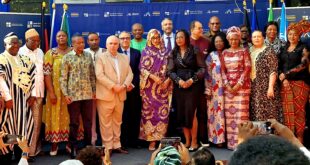Young people from across the continent, meeting in Durban, have joined forces to champion visa-free travel in Africa for Africans.
African members of the World Economic Forum’s Global Shapers community have launched the Durban Agreement on Open Africa to champion an open and border-free continent.
The initiative will support the work of the African Development Bank, among others, in promoting greater visa openness across the region.
Currently, many African countries place severe restrictions on the entry of other African nationals owing to concerns about immigration or loss of sovereignty, not to mention fears of terrorism and smuggling.
The Durban Agreement on Open Africa will make a case for how an open and border-free Africa can drive greater cultural understanding and economic integration.
The initiative was launched following a meeting of 50 Global Shapers from across Africa on the sidelines of the World Economic Forum on Africa in Durban, South Africa, which took place on 3-5 May. The decision by the Shapers to focus on openness and ease of travel followed an online conversation started by the community, #ShapingAfrica, in the weeks before the meeting.
One of the ways the Shapers will seek to build grassroots support for the Durban Agreement is to tour the continent on a specially commissioned bus named Uhuru (“Freedom”), engaging in conversations with communities as well as leaders.
Uhuru’s tour is planned to start in September, culminating at the African Union Summit in February 2018. Details of this trip are still being determined, with a full itinerary expected to be finalized in the next months.
Ghana began to issue visas on arrival to citizens of all 54 African Union member states last July. Ghana is the third country in the continent after Mauritius and Rwanda to allow visas on arrival for all Africans.
The African Union also launched a single continental passport on 17 July 2016 at the opening ceremony of the 27th Ordinary Session of the Assembly of the AU Summit in Kigali, Rwanda. Initially, the e-Passport is available only to AU heads of state, foreign ministers and permanent representatives based at the AU’s headquarters in Addis Ababa, Ethiopia. The plan is to roll it out to all AU citizens by 2018 and it’s expected to ease movement on the continent.
Experts have long argued that free movement for Africans in Africa will promote greater economic and political integration which will be beneficial for the development of the continent.
Felix Dappah
 THE AFRICAN COURIER. Reporting Africa and its Diaspora! The African Courier is an international magazine published in Germany to report on Africa and the Diaspora African experience. The first issue of the bimonthly magazine appeared on the newsstands on 15 February 1998. The African Courier is a communication forum for European-African political, economic and cultural exchanges, and a voice for Africa in Europe.
THE AFRICAN COURIER. Reporting Africa and its Diaspora! The African Courier is an international magazine published in Germany to report on Africa and the Diaspora African experience. The first issue of the bimonthly magazine appeared on the newsstands on 15 February 1998. The African Courier is a communication forum for European-African political, economic and cultural exchanges, and a voice for Africa in Europe.































